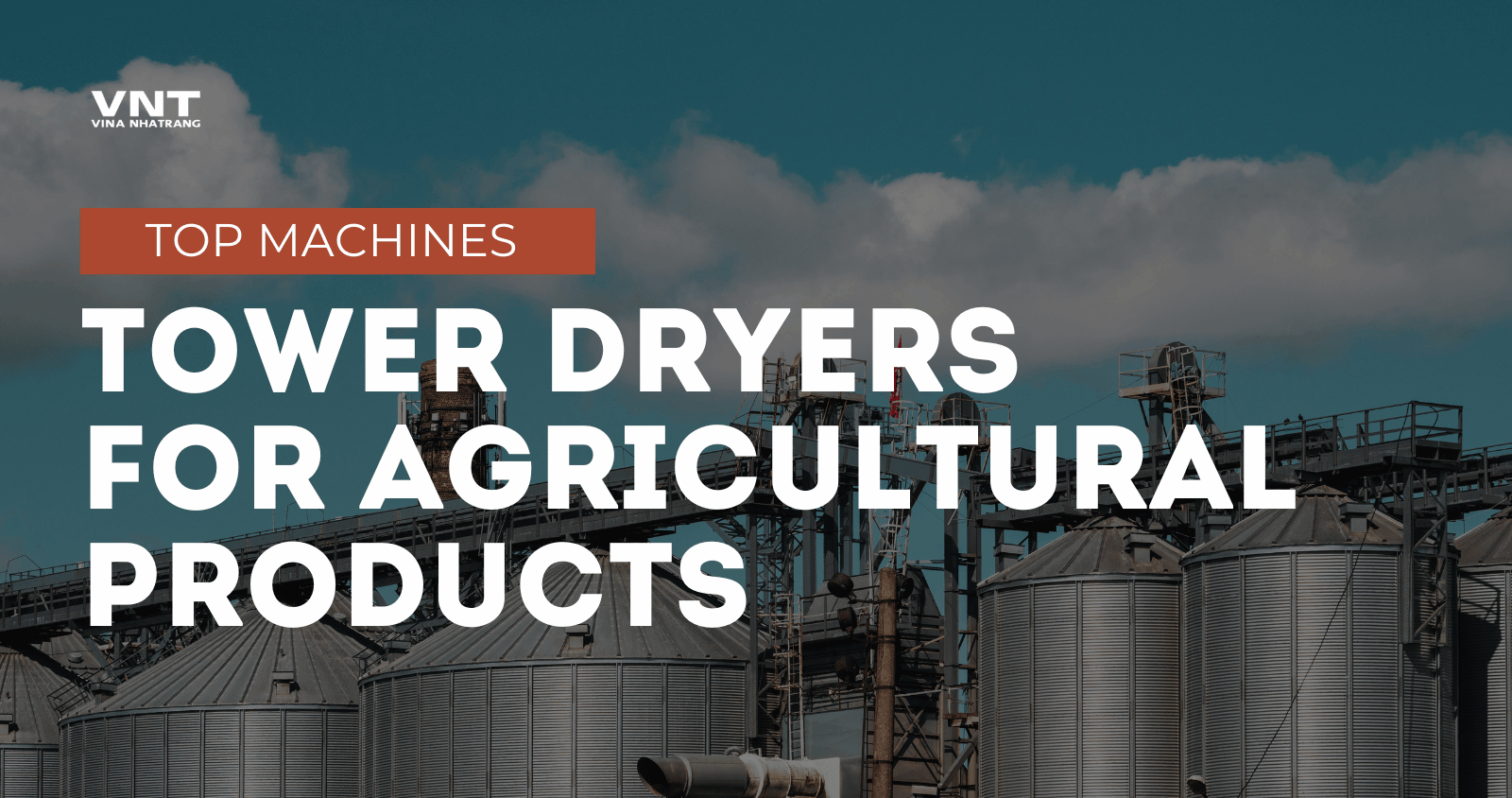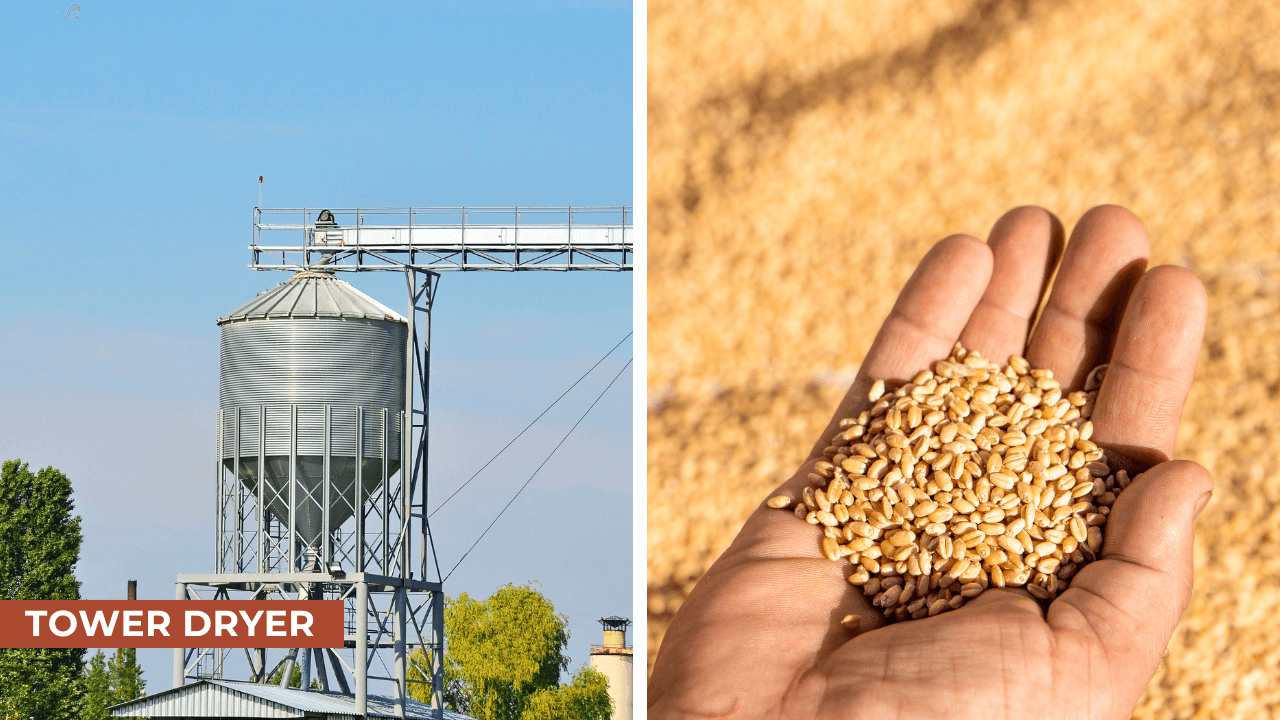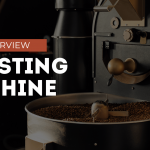In the world of agriculture, effective post-harvest management is crucial for ensuring crop quality and minimizing losses. Tower dryers have emerged as essential equipment for agricultural businesses, allowing for the rapid and efficient drying of a variety of products, from grains to specialty crops. As farmers and agribusiness owners seek to improve their drying processes, understanding the features and capabilities of different tower dryers becomes imperative.
With numerous models available on the market, making an informed choice requires a careful comparison of key factors such as energy efficiency, drying capacity, versatility, and automation features. In this guide, we will explore the top tower dryers in the industry, providing a comprehensive comparison to help you find the right solution for your operation. Whether you’re managing a small farm or a large agricultural enterprise, selecting the right tower dryer can significantly impact your productivity and profitability.
Why Tower Dryers Are Essential for Agribusinesses
Tower dryers are specialized machines that rapidly reduce the moisture content in agricultural products, making them crucial for extending crop storage life and improving quality. Here’s why investing in a tower dryer matters:
- Improved Storage and Transportability: By lowering moisture levels, tower dryers prevent mold, bacteria, and other spoilage factors from affecting stored crops.
- Energy Efficiency: These dryers are designed for high-volume processing, using advanced heat recovery systems to minimize energy usage.
- Enhanced Crop Quality: Controlled drying conditions retain nutrients and appearance, making crops more appealing in the marketplace.
- Cost Savings: Preventing crop loss post-harvest saves farms significant financial losses, especially for high-value crops like coffee and specialty grains.
Features to Look for in a Tower Dryer
Selecting the right tower dryer involves careful consideration of specific features that directly impact a dryer’s performance and operational efficiency:
1. Energy Efficiency and Sustainability
Energy efficiency is a prime factor, as it affects both operational costs and environmental impact. Look for dryers that use advanced heat recovery systems and offer multiple fuel options:
- Heat Recovery Technology: This feature reduces wasted heat, recirculating it back into the drying process, thereby saving fuel.
- Fuel Options: The best dryers allow flexibility in energy sources, such as natural gas, electricity, biomass, or steam. This flexibility is valuable for businesses that may switch fuel sources based on availability and cost.
2. Capacity and Scalability
For both small and large-scale agribusinesses, choosing the right capacity ensures you can dry your harvest efficiently without excessive wait times.
- Capacity Range: High-end dryers often offer a range from 20 tons to 1000 tons per day, catering to farms with varying output volumes.
- Scalability: Certain models are modular, allowing for expansion as business needs grow.
3. Crop Versatility
Different crops require specific drying times and temperature settings to preserve quality. Selecting a tower dryer that can handle multiple crop types offers versatility:
- Grains: Corn, wheat, rice, and soybeans are common crops that benefit from tower dryers.
- Specialty Crops: Coffee beans, cocoa, and other high-value crops require precise control to avoid over-drying.
4. Automation and Control Systems
Automation simplifies the drying process, ensuring optimal moisture levels and reducing the risk of human error. Key automation features to look for include:
- Automatic Temperature Control: Adjusts temperature in real-time, maintaining consistent drying quality and preventing overheating.
- Moisture Monitoring: Advanced dryers come with sensors that monitor moisture levels, automatically adjusting the drying cycle for ideal results.
- Remote Monitoring: Some high-tech models allow farmers to monitor drying status and control settings from a remote device, increasing convenience and oversight.
5. Maintenance and Longevity
Agricultural equipment requires regular maintenance to ensure longevity, and tower dryers are no exception. Opt for models designed with easy access points, durable materials, and available local support:
- Maintenance Accessibility: Look for dryers with easy-to-access doors and panels for cleaning and repairs.
- Durability: Stainless steel and corrosion-resistant materials ensure the machine withstands weather and prolonged use.
- Local Support: Choose models from companies with strong U.S. support networks, as they offer quicker access to parts and service.
In-Depth Comparison of Top Tower Dryers
Comparison Table of Tower Dryers
| Feature | Vina Nha Trang Tower Dryer | GSI Tower Dryer | Mathews Company (MC) Tower Dryer | Farm Fans Tower Dryer | Buhler Aeroglide Tower Dryer | NEW MODEL Tower Dryer |
|---|---|---|---|---|---|---|
| Capacity | Various | Various | 100 – 500 tons/day | 40 – 800 tons/day | 50 – 600 tons/day | 30 – 700 tons/day |
| Energy Sources | Light oil, kerosene, coal, and husk | Natural gas, propane | Propane, natural gas | Natural gas, propane, electricity | Natural gas, propane, biomass | Electricity, biomass |
| Automation Features | Automatic temperature control, moisture sensors | Advanced control panels | Mixed-flow heat exchange system | Digital controls | Advanced monitoring systems | Smart control with mobile app |
| Crop Versatility | Rice, corn, coffee beans | Primarily grains | Focused on grains | Various grains | Primarily grains, some specialty crops | Grains, legumes, and seeds |
| Maintenance Accessibility | Easy maintenance, accessible components | Moderately complex maintenance | Easy access to critical components | Easy maintenance | User-friendly maintenance | Simple maintenance design |
1. Vina Nha Trang Tower Dryer
The Vina Nha Trang Tower Dryer is a versatile solution suitable for a wide range of agricultural operations. With its robust features and flexibility, this dryer caters to both small and large-scale needs, making it an attractive option for farmers seeking efficiency and adaptability.
- Energy Sources: Offers flexible energy options, including light oil, kerosene, coal, and husk. This adaptability allows users to select the most cost-effective and sustainable energy source based on availability and operational preferences.
- Automation Features: Equipped with an automatic temperature control system from 40 to 70 Celsius degrees and moisture sensors that adjust drying conditions in real-time. This automation not only enhances drying accuracy but also reduces labor costs associated with manual monitoring.
- Crop Versatility: Designed to handle a wide range of agricultural products, including grains like rice and corn, as well as specialty crops such as coffee beans. This capability allows farms with diverse crop portfolios to streamline their drying processes in one machine.
- Maintenance Accessibility: Designed for easy maintenance with accessible components, minimizing downtime and operational disruptions. Regular maintenance is simplified, contributing to the machine’s longevity and reliability.
2. GSI Tower Dryer
GSI is known for its robust and reliable tower dryers designed specifically for grain drying. Their systems are built for high-volume operations, making them an ideal choice for larger farms that prioritize efficiency and consistent performance.
- Energy Sources: Primarily powered by natural gas and propane, GSI dryers are designed for farms with reliable access to these energy sources, providing consistent performance in drying operations.
- Automation Features: Features advanced control panels that offer real-time monitoring and adjustments for temperature and moisture levels. These sophisticated systems enhance drying precision and can lead to higher-quality outputs.
- Crop Versatility: Best suited for drying grains, particularly corn, wheat, and soybeans. While primarily focused on grains, they may not perform as well with specialty crops, making them ideal for farms specializing in staple crops.
- Maintenance Accessibility: While GSI dryers are designed for durability, maintenance can be moderately complex, requiring trained personnel for optimal upkeep and troubleshooting.
3. Mathews Company (MC) Tower Dryer
Mathews Company Tower Dryers are well-regarded in the agricultural sector for their advanced technology and high-capacity capabilities. These dryers are particularly effective for grain drying and are built to meet the needs of larger farming operations.
- Energy Sources: Primarily powered by propane or natural gas, MC dryers are ideal for users with established access to these fuels, though this may limit options for those seeking alternative energy sources.
- Automation Features: Incorporates a mixed-flow heat exchange system that ensures even drying while maintaining optimal moisture levels. This advanced feature enhances drying efficiency and minimizes product damage.
- Crop Versatility: While MC dryers are predominantly focused on grain drying, they may not be as versatile with specialty crops. Therefore, farms that grow a mix of grains and specialty products may need additional drying solutions.
- Maintenance Accessibility: Designed for easy access to critical components, facilitating regular maintenance and repairs. This feature helps minimize downtime, ensuring the dryer remains operational throughout the harvest season.
4. Farm Fans Tower Dryer
Farm Fans Tower Dryers are known for their adaptability and user-friendly features, making them suitable for both medium and large agricultural operations. These dryers are particularly effective in grain drying, providing reliable performance and energy efficiency.
- Energy Sources: Utilizes natural gas, propane, and electricity, offering farmers flexibility in energy sourcing based on availability and cost-effectiveness.
- Automation Features: Equipped with digital controls for easy monitoring and adjustments, ensuring optimal drying conditions. The automation helps to minimize manual intervention, allowing for a more hands-off operation.
- Crop Versatility: Ideal for various grains, including corn, wheat, and soybeans, but may not be suitable for specialty crops. This focus on grain drying makes it a go-to choice for conventional grain farmers.
- Maintenance Accessibility: Designed for easy maintenance, with accessible components and clear documentation that assists in routine servicing.
5. Buhler Aeroglide Tower Dryer
Buhler Aeroglide dryers are known for their advanced technology and efficiency in drying a variety of agricultural products. With a focus on innovation, these dryers cater to the needs of modern farming operations.
- Energy Sources: Primarily operates on natural gas, with options for propane and biomass. This variety provides users with the ability to select the most sustainable energy source available to them.
- Automation Features: Comes with advanced monitoring systems that provide data on moisture content and temperature, allowing for precise control over the drying process.
- Crop Versatility: While primarily designed for grains, Buhler Aeroglide dryers can also handle some specialty crops, making them a versatile choice for farmers with diverse crop portfolios.
- Maintenance Accessibility: Maintenance is straightforward, with user-friendly access to critical components, which is crucial for minimizing downtime during the harvest season.
Understanding the Economic Impact of Tower Dryers
When considering the purchase of a tower dryer, it’s essential to evaluate not just the initial investment but also the long-term economic benefits. Here’s how a quality tower dryer can impact your bottom line positively:
1. Reducing Post-Harvest Losses
One of the most significant financial benefits of using a tower dryer is the reduction of post-harvest losses:
- Preventing Spoilage: Crops with high moisture content are more susceptible to spoilage. By quickly and efficiently drying products, tower dryers help preserve the quality and market value of your harvest.
- Higher Market Prices: Dried agricultural products often command higher prices. For instance, properly dried coffee beans can significantly increase your profit margins compared to wet beans that need additional processing.
2. Lower Energy Costs
As mentioned, energy efficiency is a critical feature of modern tower dryers. By using advanced heat recovery systems, you can expect:
- Reduced Fuel Consumption: Many top models, including the Vina Nha Trang, can significantly lower energy usage by recirculating hot air.
- Flexible Fuel Options: Using alternative energy sources like biomass can provide savings, especially if they are more cost-effective than traditional fuels in your region.
3. Increased Processing Speed
Speed is another essential factor in agribusiness operations. Efficient tower dryers can:
- Shorten Drying Times: This capability allows for quicker turnaround times from harvest to market, ensuring fresher products reach customers sooner.
- Support Larger Volumes: Higher capacity models enable processing of larger batches, reducing the time spent drying and increasing overall productivity.
Best Practices for Operating a Tower Dryer
To maximize the performance and longevity of your tower dryer, it’s important to follow best practices during operation:
1. Regular Maintenance Checks
Implementing a routine maintenance schedule can help identify potential issues before they become costly problems:
- Daily Inspections: Check for any visible signs of wear or blockages, particularly in the airflow systems and heating elements.
- Scheduled Servicing: Partner with a local technician for regular service intervals, ensuring all components are functioning optimally.
2. Proper Loading Techniques
How you load the dryer can significantly impact efficiency and drying effectiveness:
- Even Distribution: Ensure that the load is evenly distributed within the dryer. This practice helps maintain consistent airflow and drying rates across all products.
- Avoid Overloading: Overloading can lead to uneven drying and increased energy consumption, as the machine works harder to process the excess load.
3. Monitoring and Adjusting Settings
Utilize the automation features to your advantage by:
- Using Real-Time Data: Regularly monitor moisture levels and temperatures during the drying process. Adjust settings based on specific crop requirements to achieve optimal results.
- Logging Performance Data: Keep records of drying cycles and results, which can help refine your operation over time and inform future adjustments.
FAQs
- ❓ What is the average cost of a tower dryer?
- 💡 The cost of a tower dryer can vary widely based on capacity, features, and brand. Generally, you can expect prices to range from $10,000 to over $100,000. It’s important to consider both the initial investment and potential long-term savings.
- ❓ How long does it take to dry crops using a tower dryer?
- 💡 Drying times can vary depending on the type of crop and moisture content. On average, tower dryers can reduce moisture levels significantly within a few hours to a full day, depending on the specific model and settings.
- ❓ Are there specific crops that are better suited for tower dryers?
- 💡 Tower dryers are highly versatile and can handle various crops, including grains (corn, rice, wheat) and specialty crops like coffee beans. However, it’s essential to adjust the settings based on the specific drying requirements of each crop.
- ❓ How can I ensure the longevity of my tower dryer?
- 💡 Regular maintenance, proper loading techniques, and monitoring performance settings can significantly extend the life of your tower dryer. Investing in a model with durable construction and easy maintenance features will also help.
- ❓ Can I retrofit my existing drying system to improve efficiency?
- In some cases, it is possible to retrofit existing drying systems with energy-efficient technologies or add heat recovery features. Consult with a drying equipment specialist to explore your options.
Have more questions? Don’t hesitate to contact our experts now for assistance.
Conclusion: Making an Informed Choice for Your Agribusiness
Choosing the right tower dryer is a crucial decision for agricultural business owners. With options like the Tower Dryer from Vina Nha Trang, GSI, and Mathews Company, it’s essential to weigh the specific needs of your operation against the features and benefits of each model.
The Vina Nha Trang Tower Dryer excels in energy efficiency, versatility in crop handling, and maintenance simplicity, making it an ideal investment for diverse agribusinesses. As you navigate the decision-making process, consider consulting with agricultural experts, evaluating your crop types, and examining your energy resources to ensure that you select the best dryer for your operation.
By understanding the key factors involved in choosing a tower dryer and leveraging the information presented in this guide, you can enhance your operational efficiency, reduce costs, and ultimately improve your profitability in the competitive agricultural landscape.






